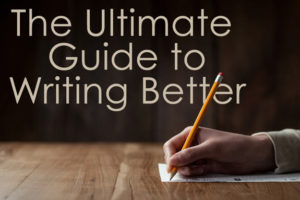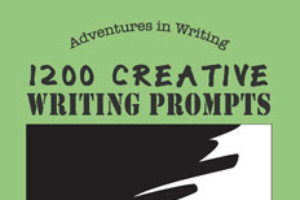
The Ultimate Guide to Writing Better
As I travel around the internet reading blogs, watching interviews, and listening to podcasts on writing, I’ve noticed that much of the focus is not on writing at all. There’s a lot of talk about writing fast, e-books versus paper books, and the fate of brick-and-mortar bookstores. But most of the chatter is focused on…Read More

Health Tips for Writers
Lots of jobs pose health hazards, and writing is no exception. Whether you write professionally or as a hobby, spending hours hunched over your keyboard or notebook can have detrimental effects on your health if you don’t take the proper precautions. From muscle cramps and eye strain to getting bogged down in the mental clutter…Read More

Excerpts from 1200 Creative Writing Prompts
Today I’d like to share a few excerpts from 1200 Creative Writing Prompts, which is packed with fiction, poetry, and nonfiction writing prompts. 1200 Creative Writing Prompts is from the Adventures in Writing series. It’s a lean book with a short introduction and three lists of prompts separated into fiction, poetry, and creative nonfiction. There…Read More

Props, a Storytelling Exercise
This exercise comes from my book Story Drills: Fiction Writing Exercises. This exercise asks you to consider an element of story that’s often overlooked in lessons and conversations about fiction writing. It’s called “Props.” Enjoy! Props Often when we talk about setting, we forget an important element: props. These are the items that appear in the narrative…Read More

20 Fun and Inspiring Character Writing Ideas
Creating a realistic character is one of the most difficult challenges in writing a piece of fiction. We’ve all read stories in which the characters were dull or hollow; they come across like clones of the same characters we’ve met in dozens of stories before. Readers want characters who are as unique and complex as…Read More

What is a Homophone?
Homophones are those annoying words that sound exactly alike but have different meanings and are often spelled differently. They give English teachers nightmares, cause headaches for students, and drive editors crazy. We writers need to be diligent about homophones because spell-check won’t catch them, and many readers cite misspelled homophones as pet peeves. And we…Read More

Self-Expression in Creative Writing
A lot of people first come to creative writing because they want to express themselves. Emotions are running high, ideas are flying, and opinions are in full supply. What better way to get it all off your chest than writing it down? Self-expression is the act of giving form to our thoughts, ideas, experiences, and…Read More

What’s the Difference Between Good Writing and Great Writing?
A good piece of writing holds your attention. It flows smoothly and everything makes sense. It’s interesting and a pleasure to read. Great writing, on the other hand, doesn’t just hold your attention; it commands your attention. You become lost in it. You can’t put it down, and when you do, you want to read…Read More

What’s Your Writing Plan?
When I first started writing, it was a spontaneous affair. I was a teenager, lying on my bedroom floor; I think I was talking to someone on the phone, and I’m certain music was playing, as it always was. There happened to be a pen and a spiral-bound notebook (for schoolwork) in front of me,…Read More

Journal Prompts for Dreamers
Where do dreams come from? Many philosophers, psychiatrists, and other experts, as well as everyday people, have made conjectures about the sources of our night visions. But they remain a mystery. Some dreams are obvious, of course. We’ve all experienced dreams that are clearly relevant to what’s going on in our lives or dreams that…Read More



